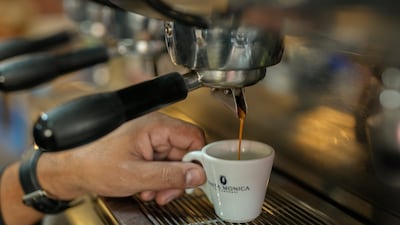As inflation drives up global coffee prices, cheaper robusta beans are in hot demand — and Brazil may be the market to supply it.
Although the production of robusta traditionally falls largely on leading supplier Vietnam, farmers there have not been able to increase output fast enough to meet soaring consumer demand.
While its production plateaus, the world’s second biggest robusta grower is picking up speed. Brazil’s output is expected to reach a new high this year, with the US Department of Agriculture forecasting its robusta production will climb 5 per cent this year as Vietnam inches lower.
“Brazil has plenty of room to increase coffee production by converting pastures into robusta crops,” said Fernando Maximiliano, an analyst at StoneX Financial in Sao Paulo. “Vietnam has no room to expand.”
Robusta coffee, used widely to make instant coffee such as Nestle's Nescafe brands or as a blend in espressos, was once seen as a poorer alternative to higher-end arabica beans, which are traditionally favoured by companies such as Starbucks. But it has been making a comeback, especially for its convenience and improving taste.
Consumers globally still drink more arabica-based beverages, but with households and companies dealing with the worst inflation in more than four decades, more buyers are giving the lower-priced robusta bean another look, despite its reputation for overpowering strength and bitterness.
Because single-origin arabicas are more expensive, a portion of robusta is often added to espresso-based beverages prepared away from home, contributing to the rising demand.
In the US, the consumption of espresso-based beverages have shot up 30 per cent since the start of the Covid-19 pandemic, signalling not only recovery from the crisis but also new growth, a survey released in March by the National Coffee Association showed. International demand for instant or soluble drinks has also been growing, including in Asia and Eastern Europe.
The pricing gap between arabica and robusta has only widened in recent years, largely due to crop issues.

Last year, Brazil’s output of the mild-tasting arabica beans plunged due to drought and frost. Second-ranked Colombia lost about 20 per cent of its production over the past two years amid excessive rains caused by La Nina. Shipping bottlenecks have only added to the woes.
As Brazil’s arabica production stalls, robusta is taking off.
Robusta is a sturdier and bigger plant, can grow in hotter places, is more resistant to drought — and has roughly double the amount of caffeine. At the same time, its production has turned more professional, yields have increased and farmers are expanding to new areas.
Since 2016, when a drought decimated robusta production, farmers have been investing in irrigation and harvest techniques, adding to the expectation 2022-23 will bring a bumper crop. While its bitter taste traditionally made it a “blend” variety, even that is shifting, with some gourmet product now made 100 per cent with robusta.
“Robusta’s sensory characteristics have changed completely due to technology and crop treatment farmers have been applying in all production stages,” said Celirio Inacio, executive director at Sao Paulo-based industry group ABIC.
Planting of robusta trees has been increasing in northern states such as Rondonia and Mato Grosso, but growth potential may be hampered by the competition with grain farmers for the land, said Guilherme Morya, an analyst at Rabobank in Sao Paulo.
“Brazil’s robusta potential is huge. The only issue is that it’s rivalling with grains, where margins have been spectacular,” he said.
More robusta production from Brazil would spell some relief to roasters and consumers alike, especially in Europe, where the natural gas crisis worsened by the war in Ukraine has compounded soaring energy costs, driving up inflationary pressures. Arabica futures prices in New York doubled in the past two years, while robusta surged 57 per cent in London.
Farmer Bento Venturim, 74, is part of Brazil’s robusta revolution. Son of an arabica grower, Mr Venturim started to adapt techniques and machines used on arabica crops to his robusta farm in Espirito Santo state in the 1990s; changes have included irrigation and micro roasting.
His family-owned farm now exports special coffee. In Brazil, the Venturim family sells its own brand and supplies high-end coffee shops. His coffee sometimes fetches a premium as high as 130 per cent over regular robusta.

